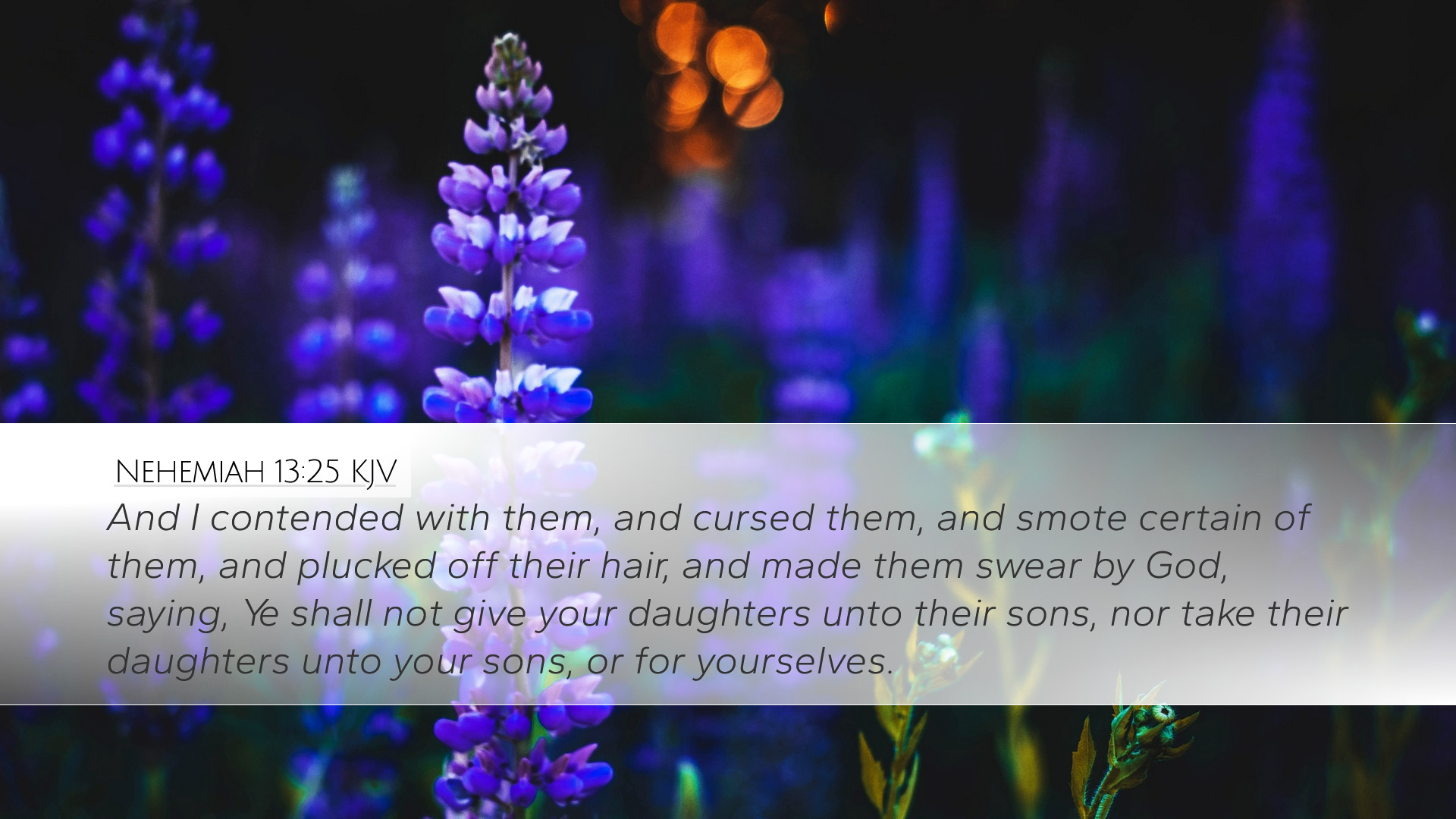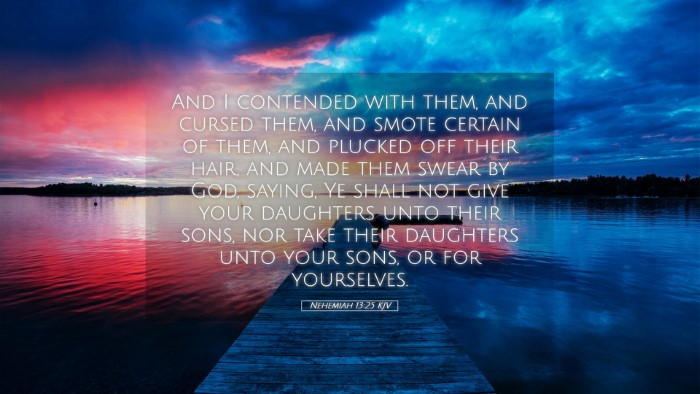Commentary on Nehemiah 13:25
Nehemiah 13:25 states, "And I contended with them, and cursed them, and smote certain of them, and plucked off their hair, and made them swear by God, saying, Ye shall not give your daughters unto their sons, nor take their daughters unto your sons, or for yourselves." This verse presents a critical moment in Nehemiah's leadership as he confronts the people of Israel regarding their intermarriage with foreign nations, a practice which he viewed as a direct violation of God's commands.
Contextual Background
The book of Nehemiah is situated in a post-exilic context where Jewish exiles return to Jerusalem and seek to restore their community and worship practices. Nehemiah, a governor, leads these efforts with determination and vigor. However, as he returns to the rebuilt city, he finds that many have strayed from the covenant obligations outlined in the Torah, particularly regarding marriage laws.
Examining the Text
This verse reveals Nehemiah’s deep commitment to the holiness and purity of the Israelite community. The specific actions he undertakes convey his intense concern:
- Contending with them: Nehemiah engages directly with those involved, demonstrating a model of leadership that confronts sin openly.
- Cursing them: This act signifies a strong denunciation of their actions, emphasizing the seriousness of their infraction against God’s law.
- Smote certain of them: This physical reaction indicates Nehemiah's passionate commitment to purity, reflecting the seriousness of the covenant violations.
- Plucking off their hair: This act symbolically represents disgrace and shame, serving as a poignant reminder of the gravity of their actions.
- Made them swear by God: This invoking of God’s name emphasizes the solemnity of the commitment they were to uphold.
Theological Implications
Nehemiah’s actions in this passage highlight several theological themes that are essential for understanding the broader narrative of Scripture:
- The Holiness of God: The contention Nehemiah shows reflects the holiness of God and the expectation that His people remain distinct and set apart.
- Covenantal Faithfulness: The demands made by Nehemiah demonstrate the seriousness with which covenant obligations were to be viewed. Intermarriage posed a threat to the spiritual integrity of Israel.
- Leadership Responsibility: Nehemiah exemplifies the role of leaders in addressing sin within the community. His passionate response serves as a model for contemporary church leadership.
- Restoration and Renewal: This passage signifies a moment of crisis that leads to restoration as Nehemiah seeks to realign the community with God’s plans.
Insights from Commentators
Various public domain theologians provide valuable insights into Nehemiah 13:25:
Matthew Henry
Henry emphasizes Nehemiah’s zealous approach to immorality and the need for community accountability. He notes that Nehemiah's extreme actions served as a warning and a call to repentance. Henry suggests that leaders must be prepared to confront sin decisively, for the sake of the community’s spiritual health.
Albert Barnes
Barnes points out that Nehemiah’s strong measures were not mere personal vendetta but stemmed from a profound concern for the covenant with God. He stresses that the intermarriage with foreign entities would lead to the adoption of idolatrous practices, thus corrupting the worship of Yahweh. Barnes underscores the necessity for spiritual vigilance in maintaining the integrity of the community.
Adam Clarke
Clarke discusses the cultural and historical implications of Nehemiah's actions, particularly the cultural clash that arose from intermarriage. He interprets Nehemiah's responses as a reflection of his pastoral duty to guide and correct the people according to divine standards. Clarke also notes the historical significance of returning to God's commandments as a safeguard for future generations.
Practical Applications
For pastors, students, and theologians, Nehemiah 13:25 challenges the approach to purity within the community of faith. The following applications can be drawn:
- Fostering Accountability: Creating a culture of accountability when it comes to purity in both personal and communal worship practices.
- Addressing Sin Boldly: Developing the courage to address issues within the church that lead to compromise and dilution of faith.
- Understanding the Importance of Distinction: Recognizing the importance of maintaining distinctiveness in faith practices to honor God’s holiness.
- Encouraging Conformity to God’s Will: Urging congregations to align their lives more closely with scriptural commands to avoid the pitfalls Nehemiah warns against.
Conclusion
Nehemiah 13:25 serves as a vivid reminder of the need for leaders to be vigilant in their spiritual stewardship. The passionate actions of Nehemiah reveal the depth of commitment required to maintain holiness and fidelity to God. As we reflect on this passage, let us be moved to pursue purity and covenantal faithfulness in our own lives and communities, learning from Nehemiah's fierce dedication to God’s law.


